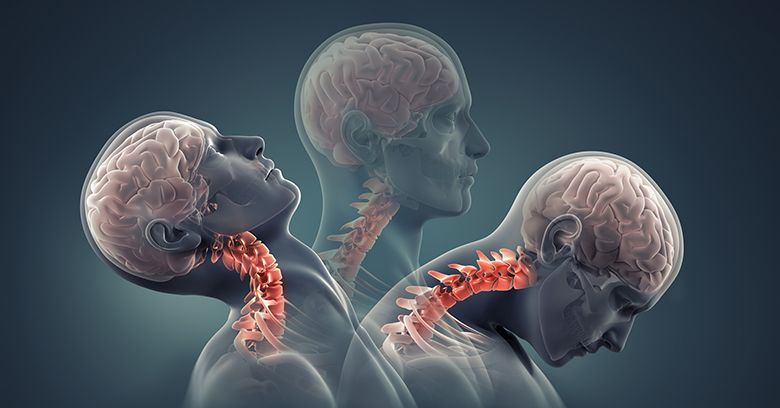There is a consensus that “whiplash” neck injuries are considered minor. Therefore, you might not feel whiplash to be a significant problem if you learn someone has it, and you might not comprehend why they are suing for damages (even if a whiplash chiropractor said it). When you experience whiplash from a car crash, the gravity of the damage is immediately obvious. It’s certainly no laughing matter!
Whiplash and Your Daily Activities
Whiplash isn’t just a minor annoyance; it can seriously mess with your day-to-day life. Professional whiplash chiropractors know the impact all too well – if you’re dealing with this issue, don’t hesitate to get help.
Symptoms
One common and most noticeable symptom is neck pain, which can be mild to severe, depending on the severity of the injury. This pain usually radiates into the shoulder area and may cause headaches.
The discomfort caused by whiplash may limit regular head movements, such as turning from side to side or looking up and down. In addition, you may experience dizziness, poor concentration, memory problems, numbness, or pins-and-needles sensations in various parts of your body.
Furthermore, the psychological implications of experiencing a whiplash injury cannot be ignored. Anxiety and depression are common responses to any traumatic event; car accidents are no exception.
Some people may even develop post-traumatic stress disorder (PTSD) due to a car accident. Therefore, it is essential to stay alert for any signs of psychological distress after an injury and seek professional help.
Whiplash injuries can be very debilitating and can have long-term consequences. Therefore, it is essential to take the necessary steps to properly diagnose and treat whiplash chiropractors, seeking medical attention from qualified professionals such as physiotherapists or chiropractors who specialize in this type of injury.
If not managed correctly, there may be lingering effects that continue to affect your daily life for years to come. So you must pay attention to the symptoms associated with whiplash and get early treatment if you have one.
Causes of Whiplash Aside From Car Accidents
Car accidents are not the only cause of whiplash. Whiplash can also be caused by:
- Falls
- Sports injuries
- Physical abuse
- Contact sports
Whiplash is most commonly associated with car accidents because it is the most common type of injury resulting in whiplash. However, falls and sports injuries are also common causes.
Whiplash can be a severe injury. It can cause neck pain, headaches, dizziness, and fatigue. If you think you have whiplash, you must see a doctor as soon as possible. Whiplash can often be treated with physical therapy and pain medication. However, in some cases, surgery may be necessary.
Chiropractic treatments and massage therapy can also provide relief and help speed up healing. With proper diagnosis and treatment, whiplash pain and other symptoms can often be alleviated in no time. However, if left untreated, it could lead to chronic neck pain lasting many years.
Long-Term Repercussions of Whiplash
Depending on the severity of your injury, whiplash can affect your life in both the short and long terms. This kind of injury can occur as a personal injury, like a car accident, or as an occupational injury, like a slip and fall where your head is violently jerked backward.
Injury claims can be significant, especially if you experience your symptoms later on and they get worse. When an accident occurs at work, employers should be held accountable for taking all necessary precautions to ensure your health and safety.
Given that whiplash can have a permanent negative impact on a person, negligence can make someone liable.
Whiplash, which at first glance seems unimportant, can have a negative impact on your family’s comfort and financial situation. Over time, the pain can become chronic and require long-term treatment or surgery.
In some cases, people may suffer from anxiety or depression due to their inability to work or enjoy activities they once did before their injury.
In addition to physical and psychological damage, whiplash can also affect your ability to go about your daily routine. You may experience fatigue, insomnia, dizziness, nausea, and blurred vision.
Whiplash patients have often been prescribed medication for the pain, which can cause further side effects like headaches, stomach cramps, and more fatigue. Long-term recovery is often necessary to restore a patient’s life to normalcy.
When Whiplash Symptoms Affect Your Mental Health
Pain and fatigue associated with a whiplash injury can have a detrimental effect on mental health. Symptoms such as insomnia, depression, anxiety, PTSD, and mood swings can accompany the physical pain of whiplash. Insomnia is often one of the first symptoms due to the chronic pain from whiplash.
It can be challenging for those who suffer from whiplash to get enough restful sleep because of their painful condition. This lack of adequate sleep can lead to increased stress levels and contribute to other mental health problems like depression and anxiety.
Depression
Depression is also common among people suffering from whiplash injuries. The constant pain that comes with this type of injury can cause individuals to become increasingly isolated and withdrawn from social activities.
This can lead to feelings of low self-worth and hopelessness. In addition, some people may also experience difficulty concentrating on activities or making decisions due to their physical pain.
Anxiety
Anxiety is another common mental health problem that can accompany a whiplash injury. It is not uncommon for individuals suffering from whiplash to have frequent worry and fear about their condition and how it will affect them in the future.
As a result, they may become overly anxious about going out in public or engaging in activities that could further aggravate their condition. Additionally, these individuals may experience panic attacks which can be highly disruptive and disabling.
Post-Traumatic Stress Disorder
Post-traumatic stress disorder (PTSD) is a debilitating psychological disorder that can often result after experiencing a traumatic event such as a car accident. Those suffering from whiplash may experience flashbacks, nightmares, and other symptoms associated with PTSD.
Therefore, it is essential for those suffering from whiplash to seek treatment for their mental health issues as soon as possible to prevent them from worsening and causing further disruption in daily life.
Mood Swings
Mood swings can also be a symptom of whiplash injury. Individuals may experience sudden shifts in mood that can range from sadness to anger or even euphoria. These swings can lead to an emotional roller coaster and have an effect on one’s relationships, work performance, and overall well-being.
For this reason, it is essential for individuals suffering from whiplash to seek help from a mental health professional if they are experiencing any of these symptoms.
Whiplash can severely affect mental health, and those who suffer from it should seek appropriate treatment as soon as possible. With the help of a healthcare professional, individuals can work through their physical pain and learn how to cope with the associated psychological symptoms to improve their quality of life.
We know just how much whiplash can affect anyone’s life. At Peak Potential Family Chiropractic in Houston Heights, TX, we specialize in helping people recover from whiplash and the associated mental health issues. Our experienced chiropractors and medical professionals are dedicated to assisting individuals to reach peak performance and get back to living their best lives.
Contact us today to learn more about how we can help you regain your mental health after a whiplash injury.




